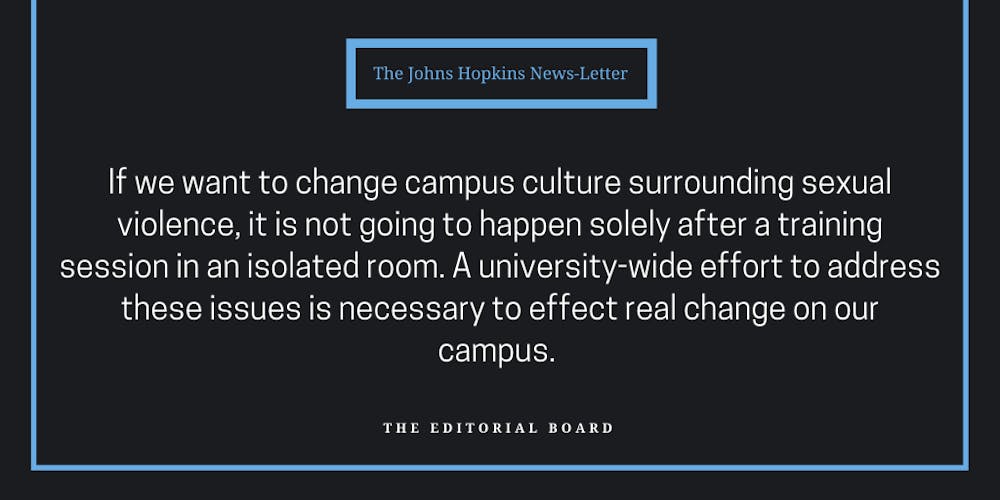Students have long criticized the University’s Office of Institutional Equity (OIE). Tasked with fostering an environment free from harassment and discrimination, OIE should be a useful and effective resource for the Hopkins community. Instead, it is underfunded, understaffed and unproductive.
Sexual violence continues to be prevelant at Hopkins. According to a recent OIE Satisfaction Survey conducted by a student, affiliates continue to find that the OIE investigations did not mitigate harm. In addition to complaints with OIE, students last semester called out victim-blaming in University messaging surrounding an alleged intentional drugging. The University’s original announcement blatantly targeted victims and failed to appropriately condemn the perpetrators.
In response to this announcement, students organized the Not My Campus protest. They called for measures to make campus a safer space for survivors and held a candlelight vigil for survivors of sexual assault. Raising awareness for these topics is important. However, students cannot be the sole drivers of this change — we need University support.
We appreciate the administration’s efforts to conduct Campus Climate Surveys, which have been used to expand OIE services and implement Bystander Intervention Training (BIT). In a similar vein, the Provost's Sexual Violence Advisory Committee (SVAC), centered around providing community input to the provost, also includes students. Following the Not My Campus protest last fall, students have been meeting with members of the administration to continue the dialogue started at the event.
Creating avenues for student input is a step in the right direction, but more needs to be done.
The University of Maryland, College Park (UMD) has established a sexual assault prevention plan with a detailed timeline and programming structure that reinforces prevention training to its students. Similarly, students at The University of Maryland, Baltimore are required to complete Title IX training annually. Georgetown University is reinforcing its sexual violence prevention messages, now delivering educational programming throughout the entire academic year.
Hopkins should make similar changes. Currently, sexual misconduct trainings are completed by freshmen and transfer students before even arriving on campus. The online modules are easy to tap through absentmindedly, likely not sticking with students for years after completion.
BIT, which students must complete during their freshman year, further educates students on consent and gender-based violence. However, these issues don’t stop after the first year of college. Reinforcing the lessons learned in sexual misconduct trainings and BIT sessions past freshman year is necessary.
With all of its available resources, the University must employ a more proactive plan. Follow-ups on the Campus Climate Survey must be conducted by the Counseling Center with students who opt in. Not only will this prove the University cares about its students, it will minimize the burden placed on survivors to reach out for help.
According to the University, such surveys are used to improve existing programs and expand resources. The “I Ask, I Listen, I Respect” campaign was created based on the results of a previous Campus Climate Survey. This campaign should have a wider reach on campus. If the University put the same effort into promoting consent on campus that it did promoting COVID-19 policy compliance, it would greatly expand its audience.
At this point, the Sexual Assault Resource Unit seems to be the sole voice on campus raising awareness and promoting consent. The University must share in this work. SVAC must increase its transparency by publishing progress reports and outlining feasible plans of action.
This shouldn't be a huge ask. Other schools are attempting to do this: UMD offices, for instance, have hosted the Clothesline Project and Purple Light Nights, events which promote awareness of sexual violence, relationship violence, and, more broadly, power-based violence.
Other schools are not perfect, either. However, we look to their university-led campaigns as potential inspiration for our own imperfect institution.
If we want to change campus culture surrounding sexual violence, it is not going to happen solely after a training session in an isolated room. A university-wide effort to address these issues is necessary to effect real change on our campus.





